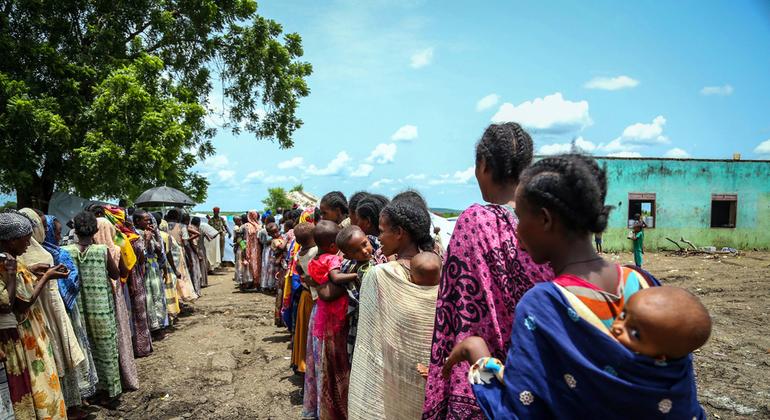
Further food ration cuts are imminent for refugees as humanitarian needs multiply around the world while funding struggles to keep pace, the UN food relief agency warned on Monday, World Refugee Day.
“As global hunger soars way beyond the resources available to feed all the families who desperately need WFP’s help, we are being forced to make the heart-breaking decision to cut food rations for refugees who rely on us for their survival,” said David Beasley, Executive Director of the World Food Programme (WFP).
Africans on the brink
The sombre warning comes as WFP has already been forced to significantly reduce rations to refugees across its operations.
Ration cuts of up to 50 per cent are affecting three-quarters of all refugees supported by WFP in Eastern Africa, with those living in Ethiopia, Kenya, South Sudan and Uganda most affected.
Numbers tell the story
- 3 million people, including 27.1 million refugees and 53.2 IDPs were forcibly displaced by end-2021.
- 100 million were forcibly displaced by end-May 2022.
- Nearly 10 million refugees were assisted by WFP in 2021.
- In Southern Africa, WFP requires nearly $113 million to support refugees over the next six months.
- In Eastern Africa, WFP needs nearly $411 million to support refugees for the next six months.
- In West Africa, WFP needs $76.5 million to support refugees for the next six months.
Severe funding constraints in West Africa, where hunger has reached a record high in a decade, have forced WFP to significantly reduce rations for refugees living in Burkina Faso, Cameroon, Chad, Mali, Mauritania and Niger.
Meanwhile, WFP assists on average 500,000 refugees in Southern Africa annually.
Despite generous support from donors, resourcing remains insufficient to meet the very basic needs of refugee households and imminent disruptions are expected in Angola, Malawi, Mozambique, Republic of Congo, Tanzania and Zimbabwe.
“Without urgent new funds to support refugees – one of the world’s most vulnerable and forgotten groups of people – many facing starvation will be forced to pay with their lives,” Mr. Beasley warned.
Impossible choices
Hamstrung by funding constraints, WFP is having to prioritize assistance to ensure that vital food reaches the most vulnerable families first – often leaving refugees without support at a time where food assistance is the difference between life and death.
As WFP is forced to institute ration reductions to stretch limited resources, this year saw an additional six million refugee movements from Ukraine.
In response, WFP in Moldova has delivered nearly 475,000 hot meals to affected families across 31 different localities.
According to the latest figures released by the UN refugee agency (UNHCR), 67 per cent of refugees and asylum seekers have originated from countries with food crises in 2021.
This, coupled with devastating conflict and climate extremes, is hitting refugees the hardest.
While the immediate needs of refugees remain WFP’s top concern, more than ever there is also a need now for sustained investments in programmes that foster the self-reliance of refugee populations.
WFP, together with partners and governments, is working towards building and supporting livelihood and resilience programmes for refugees.
In 2021, the UN agency assisted nearly 10 million refugees globally.

WFP/Cheick Omar Bandaogo
WFP provides food and cash-based assistance to Malian refugees in the Burkina Faso city of Dori, located in the Sahel region.
